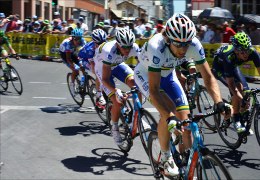28 October 2014
 A new technology that measures changes in the heart rate response to exercise could revolutionise elite athlete training and transform what has been, to some extent coaching intuition, into a more reliable science.
A new technology that measures changes in the heart rate response to exercise could revolutionise elite athlete training and transform what has been, to some extent coaching intuition, into a more reliable science.
The technology being developed at the University of South Australia’s Alliance for Research in Exercise, Nutrition and Activity (ARENA) will provide an objective marker of how physiologically ready an athlete is to perform, taking the guess work out of training regimes and, in team sports such as road cycling, assisting in the selection of athletes for different roles during a race.
Researchers are recruiting athletes now to help refine the technology with the goal of having it available within the next 18 months, ready for use by athletes heading into final preparations for the Rio Olympics.
Director of ARENA at UniSA Professor Jon Buckley says the patented technology is now being developed with support from the South Australian Sports Institute and the world leader in development of heart rate monitor technology globally Polar Electro OY, based in Finland.
“The ability to determine whether an athlete is recovered or not, is a vital coaching tool to guide training and competition schedules,” Prof Buckley says.
“If you look at an AFL team, players compete every week during the season with only a six to eight day break between games.
“In the break they have to both recover and then train for the next match.
“Coaches have developed a kind of routine around this but to be able to measure each player’s individual rate of recovery could ensure a more personalised training regime, less injuries and improved overall team performance and game strategy.
“With this objective marker of recovery, coaches can determine how each athlete is tolerating changes in training load and, perhaps most importantly, whether they have recovered from previous training/competition.
“Team cycling events like the Tour Down Under and the Tour de France rely very much on understanding the recovery rates of the team and being able to spread the competition load across a long race to ensure the greatest advantage for the team leader.
“This technology will give team managers an accurate picture of who is struggling and needs to take an easy day in the peloton and who has the energy to make the breaks and keep the team earning race points. From a team strategy perspective it could make all the difference.”
Prof Buckley says researchers have been testing the technology with AFL players during its development but are now keen to work with a broader range of athletes and in particular runners and cyclists, including females.
Researchers are keen to hear from athletes interested in contributing to the study. For more information contact Prof Jon Buckley at Jon.Buckley@unisa.edu.au or telephone (08) 8302 1853.
Media contact: Michèle Nardelli office: +61 8 8302 0966 mobile: 0418 823 673 email: Michele.nardelli@unisa.edu.au


